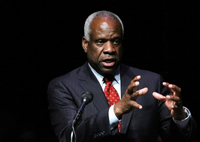When self-loathing becomes law: Clarence Thomas story (part I)
by David R. Hoffman

Whenever America commemorates past wars, or wages new ones, one persistent theme is how a particular war was essential to “the defense of freedom.”
Although the United States has fought some wars where its liberty interests were at risk, in recent times this “defense of freedom” mantra has become little more than a subterfuge to conceal the fact that America’s military is increasingly being deployed so that multi-national corporations can plunder the human and natural resources of weaker nations, and/or to divert the electorate’s attention away from the economic or political corruption engaged in by the plutocrats who truly control the country and its government.
In fact, despite all the pontificating about “freedom” that American politicians spew in their speeches, the sad reality is the document that many view as the cornerstone of American freedom, The Bill of Rights, is one of the most reviled documents in the nation.
There are two reasons for this. The first is because The Bill of Rights was designed to protect the fundamental rights of America’s minorities. This includes not only racial or ethnic minorities, but also those who espouse opinions, practice religions or make lifestyle choices that substantially differ from those of “mainstream” America. Since many Americans have been indoctrinated with the idea that “the majority rules,” they naturally look askance at anything that contradicts this ideology.
The second reason The Bill of Rights is reviled is because it was designed to serve as a check on the corrupting influence of political power. During the Constitutional Convention, the delegates who wanted the United States to have a strong federal government—the Federalists—sought to assuage the fears of delegates who desired a weak federal government—the Anti-Federalists—by creating three branches of government: legislative, executive and judicial. In theory each branch was supposed to serve as a “check-and-balance” on the other.
The Anti-Federalists, however, were not convinced that this “check-and-balance” system would adequately protect the governed from abuses by the government. So they demanded that The Bill of Rights—a list of freedoms considered so sacrosanct to the individual that neither the majority nor the government could take them away—be added to the new Constitution.
Throughout American history, however, the provisions of The Bill of Rights have been selectively enforced, protecting those who serve the power structure, while often being non-existent to those who criticize it.
A salient example of this can be discerned in the diametrical responses to two academics who chose to exercise their right to “freedom of speech”: Ward Churchill, a former professor at the University of Colorado, Boulder, and John Yoo, currently a law professor in California.
Shortly after the September 11th, 2001 terrorist attacks, Churchill wrote a controversial essay calling many who perished in these attacks “little Eichmanns,” a reference to Adolf Eichmann, a member of Hitler’s notorious SS. The right-wing, corporate-controlled media suddenly forgot how often their pundits compared “liberals” to Nazi figures, and rapidly made Churchill’s essay front-page news.
Seizing the opportunity to politically exploit the outrage over Churchill’s essay, Colorado’s governor at the time, Bill Owens, appeared on national television to demand that Churchill be fired, and allegedly threatened to reduce funding for the university if this wasn’t done.
Although the university claimed that Churchill could not be fired for exercising his free speech rights, a conveniently timed “investigation” into his background allegedly disclosed that he had engaged in plagiarism and other forms of academic misconduct. This, in turn, was used as the basis for his dismissal.
Contrast this with the lack of outrage directed against John Yoo. Prior to obtaining his current position, Yoo was a loyal devotee of the Bush dictatorship, working in the Justice Department’s Office of Legal Counsel. During his tenure there, he authored a controversial memorandum proclaiming that the fraudulently elected George W. Bush had the authority to suspend The Bill of Rights—in particular the rights to freedom of speech and press—and to arrest American citizens without legal due process or access to the court system.
Yet this is the same George W. Bush who, shortly after the September 11th attacks, claimed that terrorists hated America because of its freedoms. Who then is more repugnant: the man who used an offensive metaphor to analyze the actions of terrorists, or the man who wanted to capitulate to them by calling for the destruction of the very freedoms the terrorists themselves allegedly sought to destroy?
There are several reasons why The Bill of Rights is becoming irrelevant to the majority of Americans. One is because it does not apply to the private sector, and the happiness and well-being of most Americans is contingent upon this sector; thus there is a greater fear of offending one’s boss than offending the government. The doctrine of “at-will” employment permits an employer tofire an employee for any reason or for no reason at all; consequently if there is a choice between expressing an opinion and getting fired or remaining silent and staying employed, most people will be inclined to select the latter.
Another reason is the concerted effort to keep Americans ignorant of their freedoms under The Bill of Rights. This is being accomplished through policies like “random” drug testing in the public schools.
On the surface, it is difficult to argue with the promoted purpose of “random” drug testing, since most people will agree that deterring children from abusing drugs is a noble idea. But the real reasons for such testing are far more insidious.
First, “random” drug testing is a recipe for corruption, because private testing laboratories may be inclined to provide financial kickbacks to school officials in return for their business. Those who doubt that the rights of children can be abused for profit need only look to Pennsylvania, where two juvenile court judges have been accused of accepting millions of dollars in kickbacks in exchange for sending youthful offenders to privately owned detention centers.
Second, the term “random” is nothing more than a disingenuous way to circumvent the law. Schools already have the right to search students on the basis of “reasonable suspicion,” a lower standard than the traditionally used “probable cause.” Proponents of random drug testing, however, have deceptively argued that the use of the “reasonable suspicion” standard could raise allegations that students of certain races and genders were being discriminatorily singled out for testing. So, by hiding behind the word “random,” school officials can manipulate their computers to choose which students to test while pretending to have no control over the selection process.
But the primary reason for “random” drug testing in the public schools is to brainwash students into accepting governmental intrusions as a way of life. Testing of students often begins in the sixth grade and continues until they graduate from high school. Repeatedly being removed from the classroom and forced to urinate into a cup while a stranger stands outside and listens can easily transform impressionable children into subservient adults.
As a former professor, I’ve already observed this subservience in college-age students. Whenever I asked them their opinion about “random” drug testing in the public schools, most would reply, “If you’re not doing anything wrong, then you have nothing to worry about.”
While this explanation may sound reasonable to them, what it is really doing is decimating two fundamental rights: the right to privacy and the right to be presumed innocent until proven guilty.
In reality the right to privacy is almost dead in the United States. Anytime people leave their homes they are subject to being photographed or videotaped—on the highways, where they shop, even from outer space. Computers can track the habits of their users, expose what websites they visit, and even zoom in on their homes. Cell phones and other such devices can photograph or videotape people without their knowledge or consent, and GPS systems can track a person’s whereabouts twenty-four hours a day. In essence, unless you are a hermit living off the land in a densely wooded forest, your privacy is compromised on a daily basis.
Only one prong of the right to privacy has survived—“the right to be left alone.” But, thanks to “random” drug testing, even that right is moribund.
The Bill of Rights decrees that unless you are suspected of some criminal wrongdoing, the government is supposed to leave you alone. It also decrees that people are not required to prove their innocence. Yet it is not difficult to see how “random” drug testing policies and procedures abolish these rights, forcing children suspected of no wrongdoing to prove their innocence through compulsory urination, while being required to sacrifice their “right to be left alone” to do so.
To be continued...
David R. Hoffman, Legal Editor of Pravda.Ru
Subscribe to Pravda.Ru Telegram channel, Facebook, RSS!





